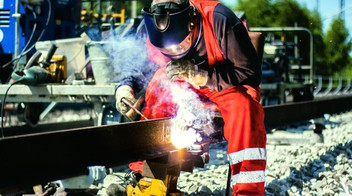Digitalization and innovation
Passenger information of the future
As part of the renewal of the passenger information facilities, a new central management and publication system (Passenger information of the future; IRIS+) is currently being developed. In combination with the passenger information platform, this system is used to display information for passengers at the station. Since December 2023, more than 750 stations have been operating with the passenger information platform and IRIS+.
In addition to the conversion of stations to IRIS+, innovations in customer information were also prepared and introduced in 2023, for example the publication of replacement services on the information boards in the station or the expansion of car sequence information on the train service indicators based on real-time data for regional and long-distance services.
At the same time, in the context of passenger information, preparations are underway for the introduction of the new systems at smaller stations: the next generation of the dynamic visual display (Dynamische Schriftanzeiger; DSA+) at the station will, in future, also be controlled via the new passenger information platform and IRIS+. All 6,800 displays are therefore being replaced across Germany. About 300 of the new generation of displays have been installed so far. There are plans to replace a further about 1,200 DSA+ displays in 2024. These new devices will be equipped with an additional interactive customer display using energy-saving e-paper technology, which clearly summarizes existing timetable changes and can be used for flexible location-based information. The aim is to reduce the increasing cost of producing and distributing paper notices caused by construction work, while at the same time further improving passenger information.
WiFi at stations
As of December 2023, our customers and station guests were provided with WiFi services free of charge at more than 600 stations. These services are implemented both through DB’s own WiFi installations (available at 152 major hubs, including all central stations of the highest category) and through WiFi networks from cooperation partners. This means that the WiFi services at stations already reach more than half of all passengers each day. In the fourth quarter of 2023, a service concession was awarded to another cooperation partner who intends to install WiFi infrastructure at about 800 additional, predominantly medium-sized stations. This service will be available free of charge.
Realignment of online channels
We continued to expand the reorganization of our online channels through the main channel bahnhof.de with the aim of increasing our reach. The focus continues to be on redesigning station information, accessibility and improving data quality. In addition, a digital interactive station map with key “points of interest” at each station location has been integrated. Moreover, a digital departures and arrivals board has been successfully introduced for all stations in Germany. Both features met with a positive response from customers. Customer feedback is used to ensure iterative further development.
Smart City at DB Station&Service
With Smart City | DB we are seeking to improve everyday life through smart and eco-friendly services and stations in municipalities and cities. In 2023, we were able to implement further measures:
- Click&Collect at stations: “Box – The pick-up station” is a Click&Collect service that can be used to deliver consignments to parcel stations at the station and collect and return them contactlessly, irrespective of the delivery company. By the end of 2023, a total of more than 350 new parcel stations were set up at train stations.
- Mobility hubs: In the mobility sector, further services were put in place at stations in 2023. For example, the stations were fitted with mobility hubs in cooperation with S-Bahn (metro) Stuttgart. The Hamburg-Harburg station was also connected in cooperation with Hamburger Hochbahn (hvv Switch) or fitted with a mobility hub and put into operation. The largest mobility hub to date can be found at Berlin Südkreuz station, which was provided with a second hub in 2023. In 2023, a total of 35 additional mobility hubs have been set up at DB sites and municipal sites.
- Coworking services: The everyworks coworking service has expanded its network to eight locations. Cooperation locations have been established together with partners in the immediate vicinity of the central stations in Frankfurt am Main, Hamburg and Erfurt.
- Micro Depot: Micro Depots provide a logistical location within cities and can be accessed by multiple providers and used according to the multiuser principle. Deliveries to residents are then made using low-emission and low-noise small vehicles such as (e-)cargo bikes. In 2023, Micro Depots were opened in Hamburg-Altona, Dresden-Neustadt and Berlin-Charlottenburg in close consultation with the local authorities.
- Smart City partnerships: As part of our existing partnership with the Free and Hanseatic City of Hamburg, we held a hackathon in 2023. Stations along the S21 line are being modernized and made more appealing through a joint initiative. Together with our partner, the City of Hanover (LHH), an art installation was created at Hanover central station that brings a pedestrian underpass to life and ensures greater subjective security. Moreover, we are supporting the LHH in applying for funding to build a bicycle garage in the civil defense bunker at Hanover central station. We have agreed measures with the City of Potsdam to improve the quality of stay and onward mobility at train stations in the Potsdam urban area, which will be financed by the “Smart Cities Made in Germany” funding scheme as of 2024.
- Urban analytics: Data-driven analyses of onward mobility and climate factors in and around the station were expanded in 2023 in order to plan and implement products and measures in a targeted manner in and around stations of the future and on the forecourts of these.
- Quality of stay: Product developments for quality of stay, climate adaptation measures, subjective security and new usage concepts were further developed in 2023. The combination of quality of stay and onward mobility is being tested at the Hamburg-Harburg site.
Consolidation of the station of the future approach
The integrated development of stations continued to pick up speed in 2023. Redesigned interiors, functional seating, advanced guidance systems and attractive forecourts are some of the aspects that are important for creating stations of the future where customers feel comfortable. On the basis of comprehensive findings, quality standards have been developed for each product line and combined to form a “station of the future” methodology. The standards of this methodology are also defined jointly with the Federal Railway Authority and the Federal Government.
The first stations were modernized in 2023. In 2024, further stations throughout Germany will be developed into stations of the future.
Innovative consumer offers for passengers
Through the pop-up store concept, at Berlin central station, we are offering start-ups and companies the opportunity to test innovative concepts and at the same time familiarize themselves with the station as a new retail location.
Furthermore, the new cashierless 24/7 ServiceStore at Berlin East station offers a wide range of products for travel and everyday needs. With the help of an app, the use of AI and state-of-the-art camera technology, it is possible to shop there quickly, easily and around the clock.
To provide our customers with an innovative shopping experience, we are also pursuing the roll-out of digital and cashierless self-service stores with our business partners.


